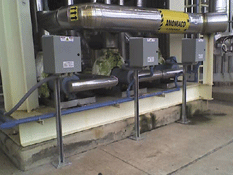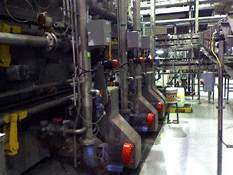|
Energy
Conservation
Industries, LLC
energy conservation for a new generationTM
|
 |
|
|
|
Energy Conservation
Process
General
Project Procedure
- –Equipment/Motor
List
-
•All
Motors/Motorized Equipment (Including Location,
Inventory ID/Number)
-
•HP
or Motor Nameplate Information or Equipment Manufacturer
Model Number
-
•Average
Annual Hours of Operation
-
•AC/DC
(specify type)
-
•VFD/Soft
Start (Yes or No)
-
•Average
Annual Utility Rate
- –Assessment
(Facility Visit)
- –Proposal/Project
Quote
- •Cost
Breakdown: Equipment, Installation (Support Labor &
Materials)
- •Energy
Conservation (kW) and Dollar Savings Projections
- •Standard
Terms
- •1
Week Following Assessment
- –Purchase
Order (+ initial deposit)
- –Manufacturing
- •8
Weeks Following Receipt of PO & Deposit
- –Shipping
(+ 2nd payment)
- •9
Weeks Following Receipt of PO & Deposit
- –Installation
(+ 3rd payment)
- •2
Weeks (Or About 4 Installs/Day/Electrician)
- –Acceptance
- •Approximately
4 Application Verifications/Hour/Person
- –Warranty
& Support
- •1
Year Standard (Extended Available)
- •Technical
Support/Troubleshooting Via Telephone/Internet
- •Product
Repair or Replacement
Payback
Payback
=

- Project
Cost:
- 1.Total Equipment Cost for Each
Application
- 2.Total Support Cost (Installation,
Service)
- Annual
Dollar Savings Driven By:
- 1.Average Annual Hours of Operation of
Equipment/Motor
- 2.Average Annual Utility Rate
- 3.Energy
Conservation (in kW)
(*in this
order/priority)
-
Hours
of Operation are contingent upon the operation of
the motors or production schedule of the facility
-
Utility
Rates can vary with time of day and/or season, and
have historically increased over the past 10 years
-
Energy
Conservation (in kW) calculations and projections
are based on Electrical Motor Energy Audit data
collected from the actual motor load during normal
operating conditions
|
|
  
|
|
| |
|